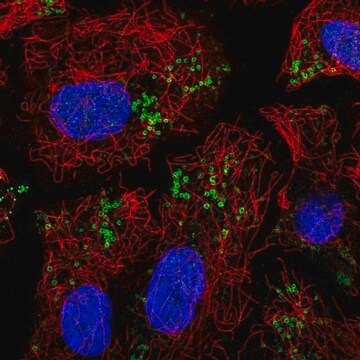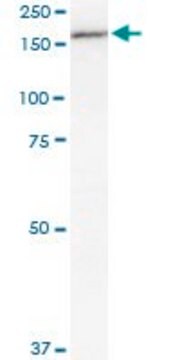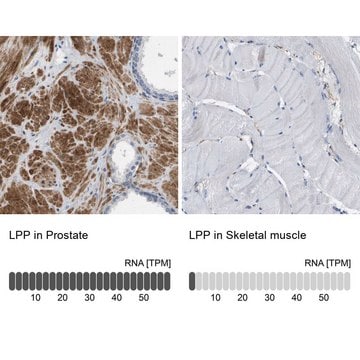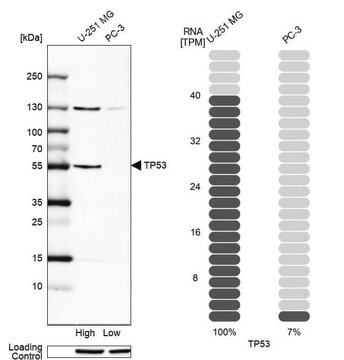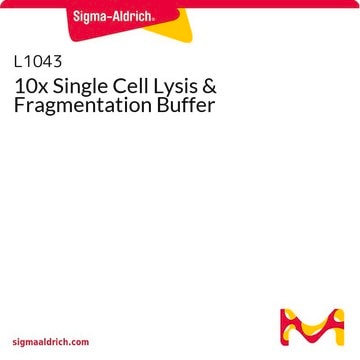GE29-1080-39
illustra™ Single Cell GenomiPhi™ DNA Amplification Kit
Cytiva 29-1080-39, sufficient for 100 reactions sufficient, storage temp.:-70°C
Sign Into View Organizational & Contract Pricing
All Photos(1)
About This Item
UNSPSC Code:
41106100
Recommended Products
usage
sufficient for 100 reactions sufficient
manufacturer/tradename
Cytiva 29-1080-39
availability
not available in Japan
storage temp.
−70°C
General description
Genomic analysis from single cells is an emerging area as researchers focus in on differences within cell populations. The amount of genomic DNA needed to carry out a full range of testing has impacted progress, and while techniques become more sensitive, sharing a single cell′s DNA across platforms is not possible.
At very low levels of input DNA, successful amplification relies on reagent quality. Single Cell GenomiPhi™ has been developed with this in mind. Lysis reagents are optimized to fully release genomic DNA from the cell and subsequently denature the DNA to enable optimal amplification and coverage. Background amplification, often associated with Multiple Displacement Amplification (MDA), is suppressed throughout the incubation so that only input DNA is amplified.
High quality reagents and an optional, proprietary enzymatic clean-up step in the protocol ensure that any potential DNA contaminants introduced during set-up are removed before each individual reaction. In addition, our manufacturing processes, including UV and enzymatic reagent cleanup, help to ensure that all kits are free from any detectable DNA contamination and enable sensitivity of amplification down to fg of gDNA.
High quality reagents and an optional, proprietary enzymatic clean-up step in the protocol ensure that any potential DNA contaminants introduced during set-up are removed before each individual reaction. In addition, our manufacturing processes, including UV and enzymatic reagent cleanup, help to ensure that all kits are free from any detectable DNA contamination and enable sensitivity of amplification down to 1 fg of gDNA.
At very low levels of input DNA, successful amplification relies on reagent quality. Single Cell GenomiPhi™ has been developed with this in mind. Lysis reagents are optimized to fully release genomic DNA from the cell and subsequently denature the DNA to enable optimal amplification and coverage. Background amplification, often associated with Multiple Displacement Amplification (MDA), is suppressed throughout the incubation so that only input DNA is amplified.
High quality reagents and an optional, proprietary enzymatic clean-up step in the protocol ensure that any potential DNA contaminants introduced during set-up are removed before each individual reaction. In addition, our manufacturing processes, including UV and enzymatic reagent cleanup, help to ensure that all kits are free from any detectable DNA contamination and enable sensitivity of amplification down to fg of gDNA.
High quality reagents and an optional, proprietary enzymatic clean-up step in the protocol ensure that any potential DNA contaminants introduced during set-up are removed before each individual reaction. In addition, our manufacturing processes, including UV and enzymatic reagent cleanup, help to ensure that all kits are free from any detectable DNA contamination and enable sensitivity of amplification down to 1 fg of gDNA.
Application
Single Cell GenomiPhi™ offers a simple two-step workflow for whole genome amplification. The amplification process is 2 to 4 hours depending on the amount of starting DNA and yields of 4 to 7 μg can be achieved.
Amplification is highly uniform over the entire genome so that locus representation remains extremely close to the original DNA sample. Furthermore, amplification is carried out with very high fidelity due to Phi29 DNA polymerase proofreading activity. DNA from single cells can be reproducibly and reliably amplified for use in many downstream applications. Single Cell GenomiPhi™ has been successfully used to generate template for SNP array genotyping, array CGH, and next-generation sequencing.
Amplification is highly uniform over the entire genome so that locus representation remains extremely close to the original DNA sample. Furthermore, amplification is carried out with very high fidelity due to Phi29 DNA polymerase proofreading activity. DNA from single cells can be reproducibly and reliably amplified for use in many downstream applications. Single Cell GenomiPhi™ has been successfully used to generate template for SNP array genotyping, array CGH, and next-generation sequencing.
Features and Benefits
Single Cell Genomiphi™ DNA Amplification kit combines the unique capabilities of Phi29 DNA polymerase with an optimized formulation to amplify genomic DNA from 1-1000 cells without background interference.
- Whole Genome Amplification of genomic DNA from as little as a single cell.
- Novel clean-up process supresses background allowing sensitivity down to 1 fg of input DNA.
- Simple isothernal strand displacement (MDA) technology using Phi29 DNA polymerase.
- Amplifications can be completed in less than 3 hours with less than 15 minutes hands on time.
- Optimized to promote complete cell lysis with uniform denaturation of DNA prior to amplification.
Analysis Note
To view the Certificate of Analysis for this product, please visit www.cytiva.com.
Legal Information
GenomiPhi
On packaging and insert:
For use only as licensed by Qiagen GmbH. and Cytiva. The Phi 29 DNA polymerase may not be re-sold or used except in conjunction with the other components of this kit. See US patent numbers 5,854,033, 6,124,120, 6,143,495, 6,323,009, 5,576,204, and equivalent patents and patent applications in other countries.
On container:
Subject to proprietary rights of Cytiva. May not be re-sold or used except with the other components of this kit. See US patent numbers 5,576,204, and equivalent patents and patent applications in other countries.
On packaging and insert:
For use only as licensed by Qiagen GmbH. and Cytiva. The Phi 29 DNA polymerase may not be re-sold or used except in conjunction with the other components of this kit. See US patent numbers 5,854,033, 6,124,120, 6,143,495, 6,323,009, 5,576,204, and equivalent patents and patent applications in other countries.
On container:
Subject to proprietary rights of Cytiva. May not be re-sold or used except with the other components of this kit. See US patent numbers 5,576,204, and equivalent patents and patent applications in other countries.
GenomiPhi is a trademark of Cytiva
illustra is a trademark of Cytiva
Certificates of Analysis (COA)
Search for Certificates of Analysis (COA) by entering the products Lot/Batch Number. Lot and Batch Numbers can be found on a product’s label following the words ‘Lot’ or ‘Batch’.
Already Own This Product?
Find documentation for the products that you have recently purchased in the Document Library.
Hongmiao Pan et al.
FEMS microbiology letters, 366(22) (2019-12-20)
Magnetotactic bacteria (MTB) are a group of microorganisms that have the ability to synthesize intracellular magnetic crystals (magnetosomes). They prefer microaerobic or anaerobic aquatic sediments. Thus, there is growing interest in their ecological roles in various habitats. In this study
Zhaojie Teng et al.
Frontiers in microbiology, 9, 2135-2135 (2018-10-03)
While multicellular magnetotactic prokaryotes (MMPs) are ubiquitous in marine environments, the diversity of MMPs in sediments of coral reef ecosystems has rarely been reported. In this study, we made an investigation on the diversity and characteristics of MMPs in sediments
Our team of scientists has experience in all areas of research including Life Science, Material Science, Chemical Synthesis, Chromatography, Analytical and many others.
Contact Technical Service
